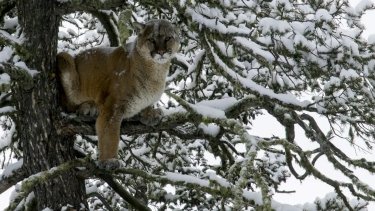Eating Mountain Lion
Cuisine, David Quammen, E. Donnall Thomas Jr., Mountain Lion
E. Donnall Thomas Jr. boasts of eating the mountain lions he hunts and speaks well of the experience. I find that surprising. I’ve eaten the meat of several carnivores at annual game dinners at the Yale Club of NYC, including African lion which I’d say tasted fishy mattress. None struck me as palatable at all. But he has tried moutain lion, and I have not.
Interestingly, he took Dave Quammen, a Yale classmate of mine whose made a prominent career as a Nature write, hunting. I read a terrific story by Quammen in the Yale Lit Freshman Year. He could write even back then.
[N]on-hunters—who make up around 80% of the general population—consistently show more favorable attitudes toward hunting when we eat what we shoot. One reason why lion hunting has proven such fertile ground for anti-hunting activists is the perception that cougars are hunted exclusively for their value as trophies. Unfortunately, there is some truth to this charge, and there shouldn’t be. In fact, as those who can overcome deep-seated but basically groundless cultural biases against eating cats are usually quick to discover, mountain lion meat is excellent.
When I prepared the backstraps from the first lion I shot and served them to family and friends, I did so out of a sense of obligation. I was raised to shoot what you eat and eat what you shoot. Since I wasn’t sure how deeply committed to that principle our dinner guests that night would be, I didn’t say much about the meat at the heart of the parmigiana until someone came right out and asked. By then it was too late for second thoughts, for everyone at the table had already declared it delicious.
Lion meat is lean, light, fine-grained and delicate, and can be prepared in any manner suitable for pork or veal. It has proven to be a consistent hit at our table, even when served to initially skeptical guests who knew full well what they were eating. It really is that good. Most states have specific meat salvage regulations on the books for big game, and a number of them, including my home states of Montana and Alaska, have expanded them to include non-traditional meat sources such as bear. There is no reason in the world not to extend these principles to include mountain lion. Doing so could well keep other states from following California’s unfortunate, biologically unjustified precedent.
Years ago, the nationally prominent writer David Quammen wrote a piece about mountain lions in the changing West for a wildlife publication to which we both occasionally contributed. The text included some mildly disparaging remarks about lion hunting which set me off even though they were neither totally unreasonable nor particularly vitriolic. I wrote a letter to the editor questioning the writer’s knowledge base and qualifications to write about the subject.
To his great credit, David contacted me, acknowledged that I had a point, and asked if I would take him mountain lion hunting. I replied that I would be delighted to do so and told him that if killing a cat would make him uncomfortable, I would be glad to provide a “catch-and-release” hunting experience, since I did a lot of that anyway. He bravely told me that if the goal was to inform him about lion hunting, that killing any cat we might tree should at least be an option.
He drove up from Bozeman one winter weekend, and we went hunting. The weather was brutal, but we covered a lot of ground by vehicle, skis, and foot. Even though we never cut a track, we learned that we had a remarkable amount in common. The high point of the experience for him was a mountain lion dinner prepared from a cat a friend had shot while hunting with me earlier in the month. We have remained good friends ever since, and he acknowledges that the experience changed his once skeptical attitude toward hunting.
So, if you are going to shoot a cougar, pack the meat off the mountain and eat it. You will enjoy the dining experience and be helping to secure the future of hunting with every bite.




